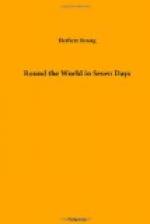The aeroplane had been seen and heard some time before it reached the spot, and its flight was watched with open-mouthed curiosity by the men, who paused in their work of carrying ashore bulky packages from the dhow. When they saw the strange visitant from the sky descending upon them, they gave utterance to shrill cries of alarm, dropped their burdens, and fled in hot haste up the shore, disappearing behind the huts. As he alighted, Smith noticed, close to the aeroplane, one of these packages, which had burst open in the fall, and saw with surprise that it contained rifles.
“I say, Roddy,” he said; “this is rather unlucky. We have interrupted a gun-running.”
“Ah, no, it is lucky, mister,” returned the Frenchman. “We shall not need now to buy rifles en route; we can help ourselves; these are contraband, without doubt.”
“That’s true, I suspect; rifles are sure to be contraband here; but this is a wild district, and the people won’t be too well-disposed towards us, coming and stopping their little game. We’ve a right to impound the rifles, I daresay, but I really think we had better look the other way.”
“Wink the other eye, as you say. Well, at present there is no one to look at. The people do not speak French, I suppose?”
“Nor English, probably. They are Baluchis, I suppose, and perhaps haven’t seen a white man before. Just look and see what’s wrong with the stay while I go up to the village and parley.”
Rodier stripped to his shirt, got his tools out of the little box in which they were kept, and set to work in as unconcerned and business-like a way as if he had been in the workshop at home. Meanwhile Smith, puffing at a cigarette, walked slowly towards the nearest hut. His easy manner gave no sign of alertness; but in reality he was keeping a keen look-out, and had already descried some of the natives peeping round the walls of the huts. Having taken a few steps he halted, looked inquiringly around, and hailed the lurking villagers with a stentorian “Ahoy!” At first there was no response, but on his advancing a little farther and repeating the call two or three swarthy and dirty-looking men came slowly from behind the nearest hut. Smith noticed the long spears they carried. He smiled and held out his hand, but the men stopped short and eyed him doubtfully, jabbering among themselves. He bade them good morning, inviting them to come and have a talk, but saw at once by the lack of expression on their faces that they did not understand him.
Somewhat perplexed, and trying to think of signs by which he could explain what he wanted, he saw a different figure emerge from the background, a small, bent, olive-skinned old man, clad in a white turban and dhoti. He came forward hesitatingly.
“Salaam, sahib,” he said humbly.
“Oh, I say, can you speak English?” asked Smith eagerly, suspecting that the man was a Hindu.
“Speak English very fine, sahib,” replied the man, with a smile.




